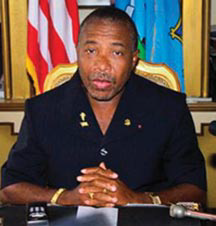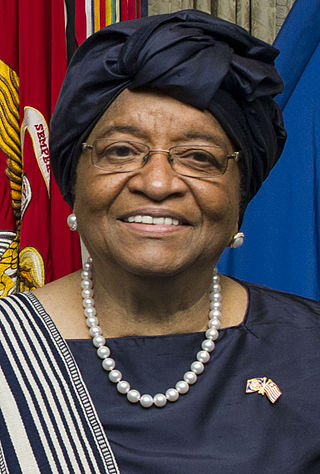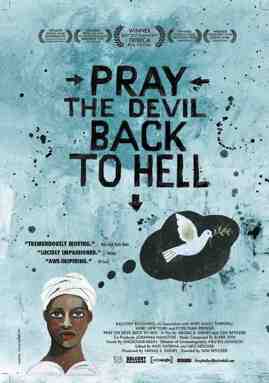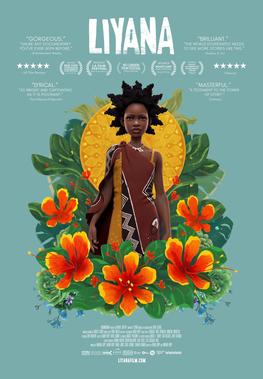Related Research Articles

Liberia, officially the Republic of Liberia, is a country on the West African coast. It is bordered by Sierra Leone to its northwest, Guinea to its north, Ivory Coast to its east, and the Atlantic Ocean to its south and southwest. It has a population of around five and one-half million and covers an area of 43,000 square miles (111,369 km2). The country's official language is English; however, over 20 indigenous languages are spoken, reflecting the country's ethnic and cultural diversity. The capital and largest city is Monrovia.

The Politics of Liberia takes place in a framework of a presidential representative democratic republic modeled on the government of the United States, whereby the President is the head of state and head of government; unlike the United States, however, Liberia is a unitary state as opposed to a federation and has a pluriform multi-party system rather than the two-party system that characterizes US politics. Executive power is exercised by the government. Legislative power is vested in both the government and the two chambers of the legislature.

Charles McArthur Ghankay Taylor is a Liberian former politician and convicted war criminal who served as the 22nd president of Liberia from 2 August 1997 until his resignation on 11 August 2003 as a result of the Second Liberian Civil War and growing international pressure.

Samuel Kanyon Doe was a Liberian politician who served as the 21st President of Liberia from 1986 to 1990. He ruled Liberia as Chairman of the People's Redemption Council (PRC) from 1980 to 1986 and then as president from 1986 to 1990.

Monrovia is the capital and largest city of Liberia. Founded in 1822, it is located on Cape Mesurado on the Atlantic coast and as of the 2022 census had 1,761,032 residents, home to 33.5% of Liberia’s total population. Its Metro Area including Montserrado and Margibi counties largely being urbanized, was home to 2,225,911 inhabitants as of the 2022 census. As the nation's primate city, Monrovia is the country's economic, financial and cultural center; its economy is primarily centered on its harbor and its role as the seat of Liberian government.

Paynesville is a suburb east of Monrovia, Liberia. It is geographically larger than the city of Monrovia and is expanding eastward along the Robertsfield Highway and northeastward beyond Red Light Market, one of the largest market areas in Liberia. Paynesville is often considered a part of the Greater Monrovia area. It was the location of the Paynesville Omega Transmitter, the highest structure of Africa, until the tower's demolition in 2011. The Liberia Broadcasting System is also located in Paynesville. The Liberian Judo Federation is based in Paynesville.

Congress for Democratic Change is a Liberian political party formed by supporters of George Weah's during the 2005 presidential campaign.

General elections were held in Liberia on 19 July 1997 as part of the 1996 peace agreement ending the First Liberian Civil War. The presidency, as well as all seats in the House of Representatives and the Senate were up for election. Voter turnout was around 89%. Former rebel leader Charles Taylor and his National Patriotic Party (NPP) won the election with 75.3% of the vote, giving it about three-quarters of the legislative seats according to the proportional representation system. Taylor was inaugurated as president on 2 August 1997.
The National Patriotic Front of Liberia (NPFL) was a Liberian rebel group that initiated and participated in the First Liberian Civil War from 24 December 1989 – 2 August 1997. The NPFL emerged out of rising ethnic tensions and civil unrest due to the Liberian government that was characterized by totalitarianism, corruption, and favoritism towards ethnic Krahns. The NPFL invaded Liberia through Ivory Coast’s border with Nimba County in Liberia under the direction of Charles Taylor, a former Liberian politician and guerrilla leader who served as the 22nd president of Liberia from 2 August 1997 until his resignation on 11 August 2003.

Ellen Johnson Sirleaf is a Liberian politician who served as the 24th president of Liberia from 2006 to 2018. Sirleaf was the first elected female head of state in Africa.
Charles Walker Brumskine was a Liberian politician and attorney. He was the leader of the Liberty Party and came third in the 2005 presidential election. He challenged incumbent Ellen Johnson-Sirleaf for the Presidency in 2011. He was also the senior partner of Brumskine & Associates, a leading Liberian law firm.
Bennie Dee Warner is a Liberian politician and clergyman. He served as the country's 25th vice president from 1977 to 1980. Black Marks on White Paper, a documentary based on the life of Bennie D. Warner was produced in 2013. The documentary chronicles the life of Bishop Warner from his early years as a native Liberian, his education, his rise to leadership in the church and nation and his nomination and election to the vice-presidency of the Republic in 1977. The film tells the story of the military coup in 1980, which led to his decision to become a missionary to America for the last 35 years. Bob Hager was the producer/Director of the documentary under auspices of Tiny Seed Films.
Greater Monrovia is one of four districts located in Montserrado County, Liberia. It contains the country's capital Monrovia. It recorded a population of 970,824 in the 2008 census.
Joshua Milton Blahyi, better known by his nom de guerre General Butt Naked, is a Liberian evangelical preacher, writer and former warlord best known for his actions during the First Liberian Civil War. During the conflict, Blahyi led a group of soldiers which fought on the side of anti-rebel group United Liberation Movement of Liberia for Democracy (ULIMO) before converting to Christianity and becoming a pastor in 1996.

Pray the Devil Back to Hell is a 2008 American documentary film directed by Gini Reticker and produced by Abigail Disney. The film premiered at the 2008 Tribeca Film Festival, where it won the award for Best Documentary. The film had its theatrical release in New York City on November 7, 2008. It had cumulative gross worldwide of $90,066.
The Iron Ladies of Liberia (2007) is an independently produced documentary film that gives behind-the-scenes access to President Ellen Johnson Sirleaf's first year in government. Johnson-Sirleaf is Africa's first female president.

Liyana is a 2017 Swazi documentary film directed and produced by Aaron Kopp and Amanda Kopp, following a group of Swazi orphans as they construct a narrative based on their own experiences. After premiering at the 2017 LA Film Festival, the film was released in the United States on October 10, 2018. It received highly positive reviews and won the award for Best Documentary Feature at the 2017 LAFF, as well as numerous other festival awards.
Lauren Selmon Roberts is an American filmmaker and film producer. She is the director of Rainbow Town, a documentary focused on orphans in war-torn Liberia.
The Chief of Staff is the professional head of the Armed Forces of the Republic of Liberia. The Chief of Staff is appointed by the President of Liberia, who is the commander-in-chief of the Armed Forces according to the Constitution.
References
- ↑ Rainbow Town™: Documentary Trailer , retrieved 2019-10-15
- ↑ "Rainbow Town | A Documentary about a Liberian Orphanage | Movie" . Retrieved 2019-10-15.